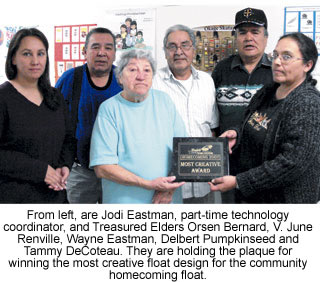 |
Canku Ota
|
 |
|
(Many Paths)
|
||
|
An Online Newsletter
Celebrating Native America
|
||
|
May 1, 2009 - Volume
7 Number 5
|
||
|
|
||
|
AAIA Program Saving Endangered Native Languages With Translated
Children's Books
|
||
|
by Vincent Schilling, Indian Country Today correspondent
|
||
|
credits: Photo courtesy of Fern Quinn
|
|
Most recently, the AAIA’s Native Language Program has written and published more than 60 children’s books in the Dakotah language and created an entire school language curriculum for kindergarten through second grade. Administrators of the language program desperately want to save the dying Native languages of today’s American Indian people. Of
the 155 Native languages spoken in North America, 135 are endangered.
Elders speak the majority of these languages fluently. Within the
timeframe of one more generation’s passing, potentially 20
Native languages are all that will remain in the Tammy DeCoteau, director of the language program, is working to stop that. She has been working with the AAIA’s Dakotah Language Preservation project on the Lake Traverse Indian Reservation since 2002. Initially, the AAIA started an intergenerational program of instruction called Dakotah Iapi! – a two-hour weekly class held at the local community college. The program led to increased usage of the Dakotah language in tribal businesses and within the tribal government. At the same time, DeCoteau noticed that children left at the college’s daycare facility during the weekly class could also benefit from a language program. As a result, the Wakanyeja Kin Unspe (Teach the Child) program was created by the AAIA to teach children the Dakotah language. In 2005, the AAIA continued work with Sisseton Wahpeton Community College to create the Family Dakotah Language Learning Center to provide language instruction for youth and adults. When elder Orsen Bernard sang to children in the Dakotah language, DeCoteau saw the need for teaching materials in Dakotah. “We realized that no matter how much you spoke in the language, everything else was in English. Every book, every song, every movie was in English. So we started creating materials to view in the language programs and schools.” Although the program is in its infancy, in just a few years time, DeCoteau’s efforts have led to the creation of more than 60 children’s books, videos and CD’s in the Dakotah language. The program also created a Dakotah language Scrabble game, a rap CD, computer applications and a theatrical play. DeCoteau also noted that other tribes wanting Scrabble in their Native languages could have them created. “We talked with the people at Hasbro and they said they would be happy to work with the AAIA to create them.” Her unique and contemporary techniques for teaching Native languages are creating such positive results that other tribes are beginning to follow suit. She said the process is simple. “It’s all on Microsoft Publisher, we send the tribe the disc, they just delete the Dakotah language, add theirs and then print it out.” “We now have an agreement with one of the Ojibwe tribes and they are translating everything into Ojibwe. We have furnished materials to tribes across the country to look and see if that is something they want to do. We’ve just sent some material to the Cherokee Tribe a couple of weeks ago for their language program.” DeCoteau said the program’s curriculum teaches much more than language; it also carries a thoughtful Native message. “We as Native people know what we want our children to learn, and a lot of times mainstream books aren’t teaching what we want our children to know. The other problem is that the characters are primarily white or black children. Very few of these books have brown children. So we wanted to make books that not only reflect our thinking, but reflect our children too.” Though
DeCoteau’s techniques are successful, she admits that ultimately
there is no avoiding a nonprofit agency’s bottom line. In today’s
questionable economic times, she worries about the continued viability
of the language program. In the midst of economic struggle, DeCoteau remains optimistic and continues to work for the preservation of the Dakotah language. “We have a proposal out right now to do a preschool immersion curriculum entirely online so that any parent in the country could learn Dakotah with their children.” Ultimately, DeCoteau believes in the strength of original Native languages. “We can do anything in our language.” http://www.indian-affairs.org/ http://www.indian-affairs.org/programs/language_preservation.htm |
|
|
||
|
|
||
| Canku Ota is a free Newsletter celebrating Native America, its traditions and accomplishments . We do not provide subscriber or visitor names to anyone. Some articles presented in Canku Ota may contain copyright material. We have received appropriate permissions for republishing any articles. Material appearing here is distributed without profit or monetary gain to those who have expressed an interest. This is in accordance with Title 17 U.S.C. Section 107. | ||
|
Canku Ota is a copyright ©
2000, 2001, 2002, 2003, 2004, 2005, 2006, 2007, 2008, 2009 of Vicki
Barry and Paul Barry.
|
||
 |
 |
|
|
The "Canku
Ota - A Newsletter Celebrating Native America" web site and
its design is the
|
||
|
Copyright ©
1999, 2000, 2001, 2002, 2003, 2004, 2005,
2006, 2007, 2008 of Paul C.
Barry.
|
||
|
All Rights Reserved.
|
||
 ROCKVILLE,
Md. – Since 1920, the Association on American Indian Affairs
has played a major part in creating governmental laws, acts and
programs to benefit American Indian people.
ROCKVILLE,
Md. – Since 1920, the Association on American Indian Affairs
has played a major part in creating governmental laws, acts and
programs to benefit American Indian people.